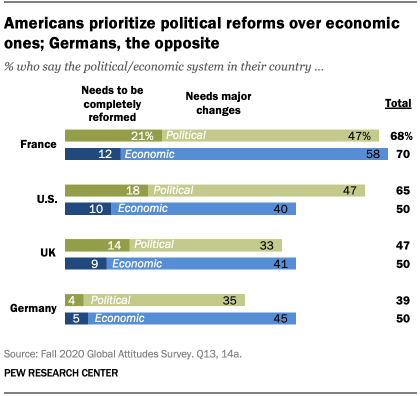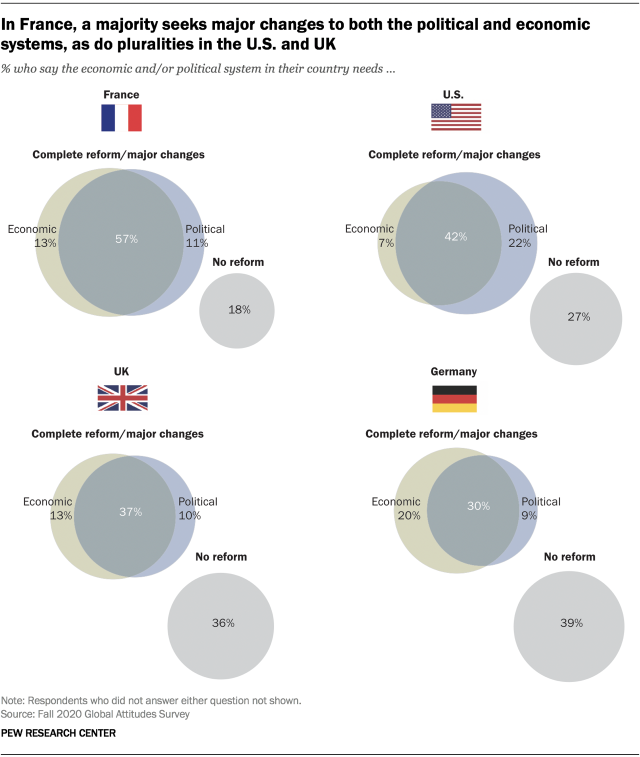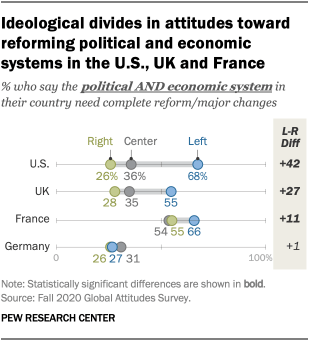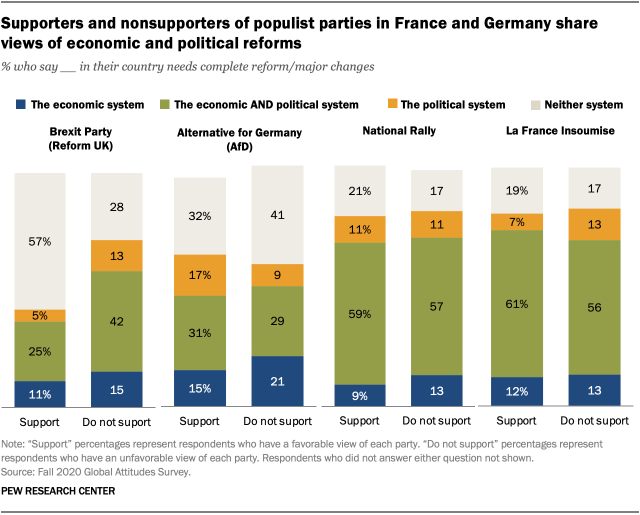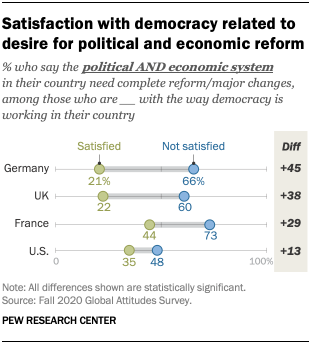In the United States and Western Europe, many people support large scale, systemic change. Across four countries surveyed in November and December of last year, around four-in-ten or more in every country describe either their economic or political system as needing at least major changes if not complete reform. But what people prioritize – and whether they prioritize both economic and political changes – varies by country, according to a new analysis of Pew Research Center data.
Here are five key findings about people’s attitudes toward systemic reforms in the U.S., France, Germany and the UK.
This report is based on an analysis of two questions which asked people about the degree to which their county’s political and economic systems require reform. Results of the question about political reform were previously reported in a March 2021 report, and results of the question about economic reform can be found here.
For this analysis, we used data from nationally representative telephone surveys of 4,069 adults from Nov. 10 to Dec. 23, 2020, in the U.S., France, Germany and the UK.
The questions used for this report, along with responses, can be found here and here, and the survey methodology can be found here.
Only in the U.S. do more people say the political system needs changes than their economic system. Around one-in-five Americans (18%) think their political system needs complete reform, and another 47% say it requires major changes, compared with 10% and 40%, respectively, who say the same about the economic system. Germany, on the other hand, is the only country among the four where more people say their economic system needs at least major changes than say this about the political system. In France and the UK, similar shares see the need for reforming the political and economic systems.
A majority in France want major reforms for both their economic and political system, as do about four-in-ten in the U.S. and UK. In France, 57% of people say both their political and economic system require at least major changes, compared with 18% who think neither need to be reformed. About two-in-ten or fewer in all four countries say either only the political system or only the economic system needs reform. In the U.S. and UK, a smaller share – 42% and 37%, respectively – say major changes are needed in both areas. In Germany, the largest share (39%) of the public say no reforms are needed.
Although between 30% and 57% of people in the four countries want at least major changes to both their political and economic system, few (5% or less) in any country want “complete reform” of both.
In the UK and U.S., those on the ideological left are much more likely to call for major changes to both the political and economic system. In the UK, 55% of those on the left say major changes are needed for both the political and economic system, compared with 28% of those on the right. Similarly, in the U.S. – where respondents placed themselves on a scale between liberal and conservative, rather than left and right – 68% of liberals prioritize changing both systems, compared with 26% of conservatives.
In Germany, the left and right are about equally likely to say major changes are needed for both the political and economic systems, but the ideological left is much more likely to say reform is needed for just the economic system (30% compared with 17% of the right).
There are also sizable partisan differences in the U.S. and UK and more minimal ones in France and Germany. For example, 57% of Democrats and those who lean toward the Democratic Party think both the U.S. economic and political system require major changes or complete reform, compared with 22% of Republicans and Republican leaners. In the UK, 50% of Labour Party supporters favor political and economic reforms, compared with 19% of Conservative Party supporters.
Those who have favorable views of populist parties are, in general, no more likely to seek major changes to the political and economic system than those who have unfavorable views of these groups. In France, for example, 59% of those who have a favorable view of the right-wing populist National Rally think both major economic and political reforms are needed – and about as many (57%) who have unfavorable views of this party agree. Views on needed reforms are also similar between supporters and nonsupporters when it comes to left-wing populist party La France Insoumise and right-wing populist AfD in Germany. And, in the UK, those who have a favorable view of the Brexit Party (Reform UK) are actually more likely (57%) than those who have an unfavorable view of the party (28%) to say no major reforms are needed to either the political or economic system.
Political and economic dissatisfaction color people’s desires for major systemic change, as does a belief that one’s government has not done a good job handling the coronavirus pandemic. Those who distrust their government or who are dissatisfied with democracy are more likely to call for both political and economic changes. In Germany, for example, those who are dissatisfied with democracy are about three times as likely to say both economic and political changes are needed as those who are satisfied (66% vs. 21%). In all four countries surveyed, those who say the statement “elected officials care what ordinary people think” does not describe their country well are more likely to call for both political and economic reforms.
Those who do not think they have a good chance to improve their own standard of living and who think the economy is doing poorly are also more likely to support systemic political and economic changes.
People who think their country has done a bad job dealing with the coronavirus pandemic are also more likely to say political and economic changes are needed than those who think their country has handled things well. In France, for example, 72% of those who think their country has done a bad job think political and economic changes are needed, compared with 44% of those who approve of France’s COVID-19 response.



